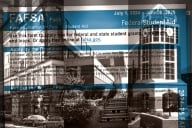You have /5 articles left.
Sign up for a free account or log in.
WASHINGTON -- As part of a settlement reached this week, the U.S. Department of Education will be required to make student loan information more accessible to blind students and order the companies it hires to collect loan payments to do the same.
The department agreed to make all websites, forms, and documents related to federal student loans accessible to blind students by, for instance, providing Braille copies and meeting universal web accessibility standards.
Department officials also agreed to instruct the student loan servicers it hires to make their websites accessible to blind borrowers, and provide notices and written communications to borrowers in accessible formats. The largest federal loan servicers include Nelnet, Great Lakes, FedLoan Servicing, and Navient, which is the loan servicing business that spun off from Sallie Mae earlier this year.
The agreement, signed Tuesday, stems from an administrative complaint filed in 2011 by a student borrower whose loan servicer, unnamed in the settlement, initially denied his request for a copy of his loan statement in Braille and assistance over the phone with filling out a change of payment form.
The Education Department granted the student’s request for those accommodations, but it did not agree to make the systematic changes he sought on behalf of all blind borrowers. The National Federation of the Blind and two other individuals soon joined the effort and threatened to sue the department for not meeting its obligations under federal disability laws.
This week’s settlement resolves all of those issues without litigation. Both parties deny any liability or wrongdoing as part of the agreement.
Mark Riccobono, president of the National Federation of the Blind, said the group was pleased with the settlement.
“It goes without saying that the inability of blind people to acquire timely information about their student loans and interact with their loan services can result in serious financial consequences,” he said in a statement. “Timely and independent access to student loan websites, loans, and documents is therefore imperative, not a matter of mere convenience.”
The settlement doesn't have any direct effect on colleges and universities, but it comes as advocates for disabled students have been stepping up efforts to get campuses to make course materials and websites more accessible.
Several disability rights groups are lobbying Congress to pass legislation as part of the Higher Education Act reauthorization that would set federal standards for accessible technology on college campuses. Groups representing colleges, though, have pushed back against such proposals, arguing that they would burden campuses with new legal requirements and stifle innovation.







